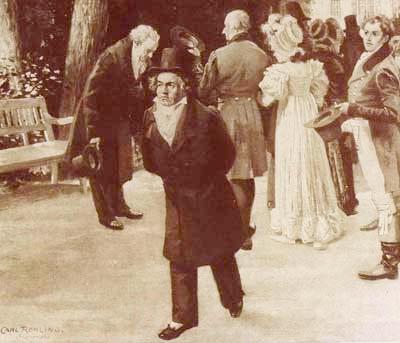All-Beethoven program rocks Mostly Mozart

Beethoven, walking to Lincoln Center. Well, not really.
Mozart was entirely absent from Friday night's Mostly Mozart concert, as Louis Langrée led the Festival Orchestra in an exploration of the music of Beethoven. The program featured soloist Jeremy Denk playing the Second Piano Concerto, Christine Brewer singing an excerpt from Fidelio and the Eighth Symphony.
The evening opened with Leonore No. 2, one of four attempts by Beethoven to write an overture for the opera that eventually became Fidelio. Mr. Langrée captured the drama of this exciting work, with its offstage trumpet solo and hard, slashing chords that evoke the opera's harsh prison setting.
Mr. Denk joined the orchestra for Beethoven's Second Piano Concerto, from the composer's early period when the composer gained fame as a concert pianist. Using Beethoven's own cadenzas, Mr. Denk presented the joyful face of Beethoven, using his technical skill to express the good humor of this music. Playing the quick keyboard runs and trills with a light, fluid touch, Mr. Denk took pleasure in the technically difficult solos as Mr. Langrée offered expert accompaniment.
Mr. Denk also appeared at the pre-concert recital. Although the pianist had planned to play Phrygian Gates, the first composition by American minimalist John Adams, he confessed to the audience that he did not feel prepared to play the work. Instead, he offered a warm, lyric reading of Beethoven's 32nd and final piano sonata. There were no complaints.
Christine Brewer took the stage after the intermission, performing "Abscheulicher! Wo ist du hin!", the heroine's soliloquy/aria from Fidelio. Although the soprano's big voice soared through most of the material, the two big high notes that serve as a double climax to the aria did not bloom fully. It should be said that it is more challenging to sing this aria "cold" instead of where Beethoven intended it: 40 minutes into the opera's first act.
Beethoven's Eighth Symphony has always struggled for acknowledgement. Wedged between the mighty Seventh and the famous Ninth, this is one of Beethoven's most light-hearted symphonies. It's also structurally unique. Each of the first three movements ends on a musical question mark, unresolved until the final bars.
Mr. Langrée led a performance that was rapid in its pace and clear in orchestral detail. The boisterous opening theme sprang forth with energy and coiled power, giving way to a main melody that embraced and uplifted. The second movement, Beethoven's musical tribute to that 1815 invention, the Metronome was played with tight, ticking precision. The boisterous finale answered all the questions of the three movements that came before, an exuberant performance that ended the concert on a cheerful note.

